Forestry Alum’s Gift Supports Great Room Renovation at Slocum Camp

R. Scott Wallinger’s successful 40-year career in industrial forestry and forestry products began with a stroke of luck and a sharp, hand-oiled double bit axe. He still has that axe. And his deep dedication to his alma mater has never been stronger.
Wallinger, who has generously supported NC State for years, has donated funds for the renovation of the Great Room at Slocum Camp at the George Watts Hill Demonstration Forest in Durham County, North Carolina.
Slocum Camp provides forestry and fisheries, wildlife and conservation biology students with what Wallinger said was the most valuable experience of his young life: a hands-on learning experience that let him decide for himself if forestry was the life for him.
Wallinger, who graduated with a bachelor’s degree in forest management in 1960, decided to enroll at NC State after completing his freshman year at Randolph-Macon College in Virginia and making a serendipitous Christmas break visit to the U.S. Forest Service offices in Washington D.C. A friend pointed out the building and suggested Wallinger drop in.
“The building was almost empty, but I found a man who was willing to talk to me,” Wallinger said. The man told the young Wallinger to do two things: get a summer job in the field and apply to NC State. The man gave Wallinger a form to apply for a summer job in a national forest.
“To this day, I don’t know what his name was. But I went home and wrote to NC State,” Wallinger said. “I filled out the application and I was accepted. And soon after, I got a letter offering me a job at Coeur d’Alene National Forest.”

Wallinger remembers his summer at Hill Forest as if it was yesterday. The first instruction from NC State professor George Slocum, for whom the camp would later be named, was to buy a professional double bit axe, remove all the varnish, polish the handle with linseed oil and beeswax, and file the blades razor sharp.
“You can’t be in forestry if you don’t know how to use an axe,” Wallinger said. “That was the great thing about camp – we learned for ourselves what forestry was. We cruised timber, identified trees, went to local sawmills, we took some field trips to a furniture factory, then up to the western mountains of North Carolina and other forests, and visited a large sawmill operation and so forth. That’s where the class and the professors really gelled.”
Wallinger recalls many summer evenings in the Great Room, where students got to know each other and listened to stories from professors and some unusual new students – military veterans studying under the G.I. Bill. The room was used as a classroom during the day, and as a gathering place relatively free of the swarm of mosquitoes and no-see-ums outside.
The experience marked Wallinger forever, and he wants current and future young foresters to have their own moments in the forest. His time in camp led him to a career he loved and inspires the work he does now in various environmental and industry groups in retirement.
Upon graduating from NC State, Wallinger went on to earn advanced degrees in forestry and business management from Yale and Harvard universities. As a Navy officer, he was a ship’s navigator and boat officer.
Wallinger’s career – he retired in 2004 as a senior vice president of MeadWestvaco and now lives in South Carolina – involved managing a large multi-state company forest and oversight of the company’s forestry, export sales and Brazilian manufacturing and forest operations.

Wallinger also served and chaired several state and national associations and co-led a forest products industry group at the World Business Council for Sustainable Development. He is a registered forester in South Carolina and a fellow and “golden” member of the Society of American Foresters.
But for all the accolades and honors that accompany a successful career, Wallinger treasures his beginnings at NC State and hopes students now and in the future feel the same way at the end of their careers.
”I hope the students to come have as much fun as I did and have exceptional opportunities along the way,” Wallinger said. “I’m not sure that students are much different today in the sense that they have decided they want to study forestry — but they haven’t worked in forestry. Time at the camp, in the Great Room, learning on the ground is really going to be their first experience.
He concluded, “When that experience ends, they will know for sure who they are and where they want to go.”
This article was written by Beth Grace for the College of Natural Resources.
- Categories:


